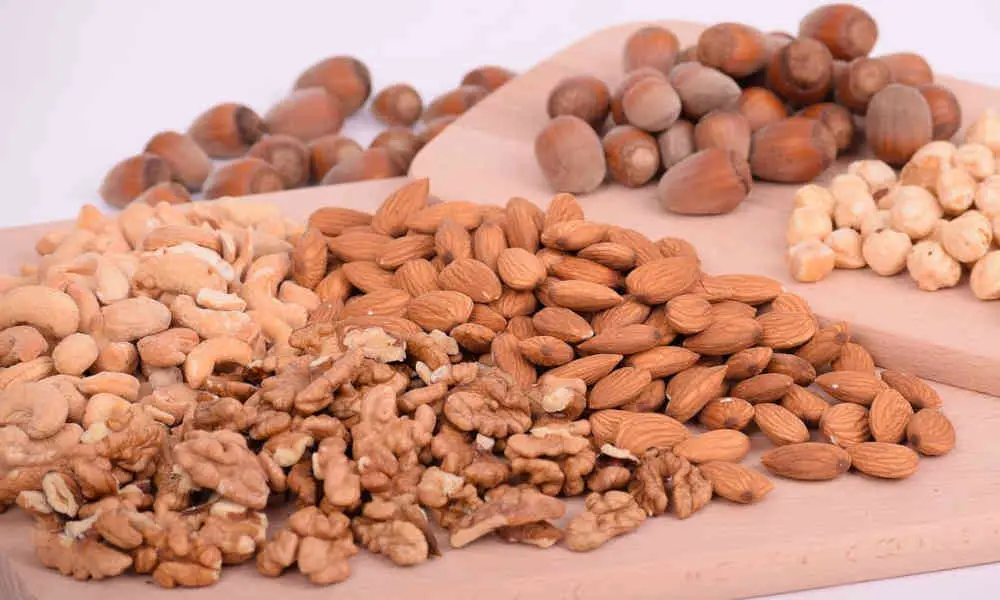What Are the Healthiest Nuts to Eat?
While a variety of nuts are good for you, they all have different nutritional qualities. We’ll discuss the health benefits of almonds, cashews, pistachios, and walnuts. You may be wondering which ones to eat. Here are some tips. These nuts are high in healthy fats and fiber. They also contain important vitamins and minerals. Eating these nuts often can increase your lifespan.

Cashews
Cashews are rich in vitamins and minerals that are beneficial for overall health. They are an excellent source of vitamin E, magnesium, zinc, and phosphorous. In addition, they have high fiber, protein, and iron, making them a complete nutrient. If you’re looking for an easy way to boost your protein intake without sacrificing flavor, cashews are the right choice.
According to studies, cashews are beneficial for heart health. Consuming nuts reduces the risk of heart disease and stroke, and they reduce triglycerides and LDL cholesterol. They may also lower blood pressure. In addition, cashews can lower blood pressure, which may be a benefit for people with type 2 diabetes. However, there is still some controversy surrounding whether cashews are beneficial for people with high cholesterol.
Eating cashews regularly can also help you reduce your risk of developing diabetes and obesity. Studies have found that cashews and walnuts are higher in omega-3 fatty acids, copper, zinc, and iron. However, it is important to note that cashews are considered tree nuts, and people with allergies to these nuts should avoid them. However, if you must have nuts, choose other seeds or high-protein snacks.
Pistachios
One of the best things about pistachios is that they are loaded with plant-based antioxidants, including vitamin E, polyphenols, lutein, and zeaxanthin. Omega-3 fatty acids are essential for cardiovascular health, and pistachios contain large amounts of this beneficial nutrient. Studies have shown that eating pistachios can help prevent colon cancer in males.
The prebiotic fiber and omega-3s in pistachios are two of the nut’s benefits for gut health. The prebiotic fiber encourages healthy bacteria in the gut that helps keep it healthy, and fiber helps the digestive system to function smoothly. Both of these substances help the body feel fuller for longer, which can decrease the temptation to eat unhealthy foods. Furthermore, raw pistachios contain the highest concentrations of phytosterols of any nut.
Another benefit of pistachios is that they are satiating foods. Pistachios contain high levels of fiber, which slows down the digestion of food and keeps us feeling fuller longer. They also help us stay focused because fiber increases the volume of our stomach, which makes us feel full longer. Pistachios also contain vitamin B6, which is important for maintaining a healthy nervous system and a strong immune system. Antioxidants in pistachios also help the body get rid of free radicals, which are responsible for aging.
While pistachios are low in calories, they are relatively high in fiber. Therefore, eating too many pistachios can cause bloating and digestive problems. Furthermore, fiber increases the number of beneficial gut bacteria called butyrate. These bacteria can aid in promoting smooth bowel movements. Pistachios are also high in antioxidants and may protect against some types of cancer.
Almonds
The nutrient-rich almond is a favorite snack for many people. These healthy nuts contain the most vitamin E of any nut, as well as protein and magnesium. They also lower blood sugar levels and improve cholesterol. Additionally, almonds help regulate weight and help prevent heart disease. So, why are almonds so good for you? Here are some reasons. Read on to learn more about the benefits of almonds.
First of all, they are delicious! You can enjoy almonds as a snack anytime you feel hungry. You can enjoy them with oatmeal, yogurt, or other nutritious food. You can even use almonds as a topping on low-fat frozen yogurt. The nutty taste of almonds will make your morning or afternoon snack healthier. They will satisfy your hunger in between meals, and you won’t feel guilty about a snack that doesn’t contain sugar.
In addition to being delicious, almonds are loaded with nutrients. They help lower LDL (bad) cholesterol and are a great source of vitamin E. They also contain high amounts of zinc, a nutrient that has been associated with fertility. In a study of 100 men between the ages of one to 35, researchers found that the men who ate almonds had higher sperm counts, better swimmers, and increased vitality.
Walnuts
Most nuts contain heart-healthy fats, but walnuts contain even more. They contain two to fifteen times more antioxidants than vitamin E. These compounds protect our bodies from free radicals that can cause disease. Other benefits of walnuts include high-quality protein, plenty of vitamins, and plenty of dietary fiber. Plus, they’re dairy-free!
Moreover, walnuts are loaded with prebiotics, which are indigestible fibers that fuel probiotics in the gut. Studies have shown that walnuts can influence gut bacteria in positive ways. Additionally, walnuts are high in melatonin, a hormone that helps regulate the body’s circadian rhythm and aids in quality sleep. In addition, recent research at UCLA suggests that walnuts may also affect male fertility.
The health benefits of walnuts go beyond their richness in monounsaturated fat. Walnuts contain an impressive amount of omega-3 fatty acids, also known as ALA. ALA is essential for overall health, and a mere handful contains as much as three ounces of salmon. Omega-3 fatty acids can help prevent disease and help lower blood pressure. Studies have shown that eating a handful of walnuts each day has many health benefits.
Aside from being rich in Omega-3 fatty acids, walnuts also help protect the heart. While all nuts contain Omega-3 fatty acids, walnuts are the only tree nut that contains significant amounts of this essential fatty acid. These benefits could be due to their richness in antioxidants and omega-3 fatty acids.
Hazelnuts
Another nut with great benefits is hazelnut. While this nut has less protein than the others, it is still a good source of fiber, magnesium, and antioxidants. Hazelnuts are also a good source of protein, though they contain less than walnuts. In fact, hazelnuts are among the healthiest nuts to eat. But you may not know all the health benefits of hazelnuts.
Pie star nuts
While a handful of pecans may sound like a snack, the fact is that they contain the least amount of carbohydrates among tree nuts. With only four grams of carbs per ounce, pecans are a perfect snack after a workout. These nuts also contain high amounts of phenolic compounds and are ideal as a post-workout snack. Plus, pecans contain the highest natural source of beta-sitosterol, which may help reduce cholesterol levels and may help treat enlarged prostate.
Conclusion
A variety of nuts is a great snack, as they’re packed with fiber, omega-3 fatty acids, antioxidants, and other healthy fats. The small, nutrient-rich nuts help fight inflammation, heart disease, and inflammation. They’re also great for your gut and can even be used in smoothies, quick bread, and muffins. In addition to salads, nuts can be added to sandwiches and wraps, as well as to dressings and dips. They can also be eaten in small amounts in the form of snacks, like candy.
All nuts contain fiber and protein, but some are healthier than others. Different types have different health benefits, so it is important to mix different types of nuts into your daily diet. However, if you’re following a ketogenic diet, walnuts are the best choice for you. Pecans and almonds are excellent sources of dietary fiber, and walnuts are high in calcium.





